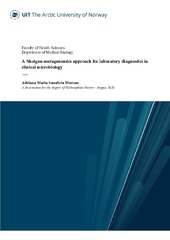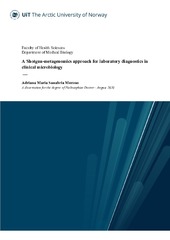| dc.contributor.advisor | Hanssen, Anne-Merethe | |
| dc.contributor.author | Sanabria-Moreno, Adriana Maria | |
| dc.date.accessioned | 2020-11-02T11:44:41Z | |
| dc.date.available | 2020-11-02T11:44:41Z | |
| dc.date.issued | 2020-11-12 | |
| dc.description.abstract | Shotgun-metagenomics (SMg) has a huge potential, particularly in clinical microbiology where conventional diagnostic methods have limitations such as diagnosis of prosthetic joint infection (PJI). The main objective of this project was to explore the use of SMg in clinical diagnostics of PJI directly from blood culture bottles (BCBs) inoculated with PJT specimens. First, we assessed the use of a BacT/Alert® Virtuo blood culture system for culturing PJT specimens. We showed that the BCB method detected a wider range of bacteria more rapidly than the conventional method making it a convenient approach for diagnosis of PJI. Then, we developed a proof-of-concept study to evaluate the use of SMg on BCBs inoculated with PJT for pathogen identification for PJI diagnosis. We developed a method for preparation of high-quality bacterial DNA from PJT for downstream SMg, established a bioinformatics pipeline, and compared SMg results with conventional culture method results. Our DNA preparation method resulted in high-quality microbial DNA from all samples allowing downstream SMg. All bacteria identified by the culture method were also identified by SMg. We obtained an acceptable high number of bacterial reads, genome coverage, and genome sequencing depth for the identification of PJI pathogens, allowing us to explore the application of SMg further. Our SMg approach also allowed the strain-level typing of Staphylococcus aureus, antimicrobial resistance (AMR), and virulence gene prediction from both monomicrobial and polymicrobial samples. However, the use of this approach for the detection of AMR to help guide clinical antibiotic usage needs to be further elucidated. Precise AMR prediction is required for the mainstream adoption of SMg into the clinical microbiology laboratory. In conclusion, these studies present an alternative approach for the application of SMg in PJI diagnosis, complementing the currently available tools. Our results might be useful in further validation and standardization for solving challenges presented in PJI diagnoses. | en_US |
| dc.description.doctoraltype | ph.d. | en_US |
| dc.description.popularabstract | Infections related to implants can lead to severe pain, persistent dislocation, and even death. An early and accurate diagnosis can help to avoid such difficulties. Today, improved diagnosis methods are needed since this is very challenging. This thesis addresses this by applying metagenomics directly on tissue samples introduced in an enhanced broth in a bottle, which guarantees faster and reliable growth. Metagenomics can be used to analyze all the genetic material within a sample at once and can be used for diagnosing infections. It involves the sequencing of all DNA/RNA from a sample, that after being decoded and compared with databases of pathogen genomes allows us to identify any pathogen. We were able to identify bacteria in tissue samples, and we showed the potential to be used for the prediction of bacterial virulence factors (cause of diseases) and antimicrobial resistance (antibiotics tolerance), being an important first step to face the presented challenges. | en_US |
| dc.description.sponsorship | This work was supported by grants from joint “Miljøstøtte” financed by Strategisk-HN05–14 (Helse Nord RFH) and Faculty of Health Sciences A20389 (2014–2017), and the National Graduate School in Infection Biology and Antimicrobials (Grant No. 249062). The publication charges for the articles have been funded by a grant from the publication fund of UiT – The Arctic University of Norway. | en_US |
| dc.identifier.uri | https://hdl.handle.net/10037/19740 | |
| dc.language.iso | eng | en_US |
| dc.publisher | UiT The Arctic University of Norway | en_US |
| dc.publisher | UiT Norges arktiske universitet | en_US |
| dc.relation.haspart | <p>Paper I: Sanabria, A., Røkeberg, M.E.O., Johannessen, M., Sollid, J.E., Simonsen, G.S. & Hanssen, A.-M. (2019). Culturing periprosthetic tissue in BacT/Alert® Virtuo blood culture system leads to improved and faster detection of prosthetic joint infections. <i>BMC Infectious Diseases, 19</i>, 607. Also available in Munin at <a href=https://hdl.handle.net/10037/16037>https://hdl.handle.net/10037/16037</a>.
<p>Paper II: Sanabria, A., Hjerde, E., Johannessen, M., Sollid, J.E., Simonsen, G.S. & Hanssen, A.-M. (2020). Shotgun-metagenomics on positive blood culture bottles inoculated with prosthetic joint tissue: a proof of concept study. <i>Frontiers in Microbiology, 11</i>, 1687. Also available at <a href=https://doi.org/10.3389/fmicb.2020.01687> https://doi.org/10.3389/fmicb.2020.01687</a>.
<p>Paper III: Sanabria, A.M., Janice, J., Hjerde, E. & Hanssen, A.-M. Typing and prediction of antibiotic resistance and virulence determinants in S. aureus using shotgun-metagenomics data from prosthetic joint tissue on blood culture bottles. (Manuscript). Available in the file thesis_entire.pdf. | en_US |
| dc.rights.accessRights | openAccess | en_US |
| dc.rights.holder | Copyright 2020 The Author(s) | |
| dc.rights.uri | https://creativecommons.org/licenses/by-nc-sa/4.0 | en_US |
| dc.rights | Attribution-NonCommercial-ShareAlike 4.0 International (CC BY-NC-SA 4.0) | en_US |
| dc.subject | VDP::Medisinske Fag: 700::Helsefag: 800 | en_US |
| dc.subject | VDP::Medical disciplines: 700::Clinical medical disciplines: 750 | en_US |
| dc.title | A Shotgun-metagenomics approach for laboratory diagnostics in clinical microbiology | en_US |
| dc.type | Doctoral thesis | en_US |
| dc.type | Doktorgradsavhandling | en_US |


 English
English norsk
norsk

